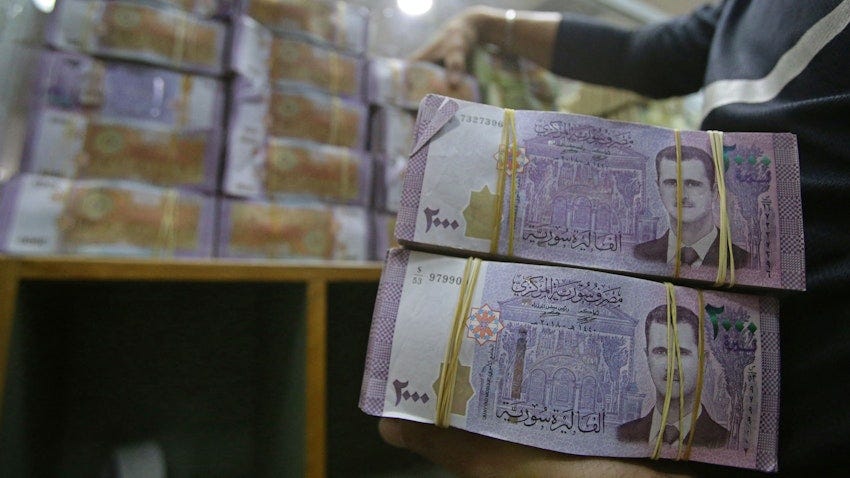Sanctions, Debt, and Israel: The Triple Threat to Syria’s Economic Future
Underdeveloped economic resources make Syria less attractive to foreign investors in its early stages, but the Syrian diaspora can kick-start economic development and boost confidence.
In recent interviews at the World Economic Forum and with the Financial Times, Syrian Minister of Foreign Affairs Asaad al-Shaibani outlined the economic recovery plan under the Hayat Tahrir al-Sham (HTS)-led government. The new transitional government aims to shift towards an open economy-centred approach focused on privatisation, attracting foreign investment, and fostering regional collaboration with Turkey, the Gulf and others. The task ahead is monumental, and the ‘Singapore and Saudi Arabia’ models that al-Shaibani hopes to replicate are made even more unrealistic by Western hesitation to ease sanctions and, more concerningly, Israel’s violent encroachment in the occupied Golan Heights.
Rebuilding Syria with an Open Economy-First Approach
Prior to the ousting of Bashar al-Assad, the Syrian economy was struggling under debilitating Western-led sanctions, which had caused the economy to shrink by an estimated 70% from its pre-war stable status. The war has left 90% of Syrians in poverty, with more than half of the population facing food insecurity and unemployment. The worsening economic situation was exacerbated by the Assad regime’s own war economy which deprived large parts of the Syria society from development and seized their resources for war efforts instead. Efforts are currently underway to secure basic needs, such as water, food, electricity, and fuel, for citizens impacted by years of war and sanctions.
Under the new leadership, Syria is shifting from a security-focused state under Assad to an open economy-centred approach that prioritises recovery and growth. To do so, HTS officials have outlined plans to transition Syria's closed economy to a free-market system that fosters private-sector growth and attracts much-needed foreign investment. This includes plans to privatise state-owned ports, factories, and industries, alongside exploring public-private partnerships (PPPs) to invest in infrastructure projects like airports, railways, and roads. At Davos, al-Shaibani specifically emphasised the key sectors the government is prioritising for reform: energy, telecommunications, infrastructure, transportation, education, and healthcare. The government also aims to encourage foreign investment and incentivise the return of Syrian investors. To support this new open economy-centred approach, structural and legal reforms are planned, including initiatives to establish a stable legal framework that will reassure investors. Additionally, a committee has been formed to assess Syria's economic conditions and develop targeted strategies for infrastructure and fiscal growth.
However, al-Shaibani has stated that the primary obstacle to Syria's economic stability is the ongoing US and EU sanctions, which he views as major barriers to both economic recovery and foreign investment. Another significant challenge is the country's debt and fiscal issues. Although the government recognises Syria’s $30 billion debt to Russia and Iran, how this debt will be settled remains unclear, and it could become a contentious issue for resuming international ties. Similarly, addressing the lack of foreign reserves, criminalised in 2013, and the decline of key industries like agriculture and manufacturing—due to corruption and neglect during his era—will be crucial for long-term economic stability.
Lastly, Syria's economic infrastructure and resources remain largely underdeveloped making them less attractive for foreign investors. Syrian investors are more likely to be inclined to invest at early stages for nationalistic reasons. Political and security instability also remain pertinent and the lack of institutional setups and an effective bureaucracy to handle foreign trade are serious hurdles facing interested international investors. Nonetheless, for political reasons, many actors will likely seek to stabilise the situation in Syria temporarily by providing primary aid and some investments. This is to prevent Syria from falling back in the hands of Russia and Iran as they continue to face western sanctions.
Regional Opportunities & Threats
Under the HTS-led government, Syria is focusing on strengthening regional ties to unlock economic opportunities and foster cooperation. The government is working to build stronger relations with Turkey, aiming to leverage Ankara’s technological expertise and regional connections, including its ties to Europe, for mutual economic benefit. Sharaa has revealed that Turkish President Recep Tayyip Erdogan was ‘one of the first’ to congratulate the rebels on taking Damascus, and further mentioned that he plans to make Turkey the destination for his first official visit. Both al-Shaibani and Syrian President Ahmed al-Sharaa have also emphasised the importance of engaging with Gulf Arab nations to reassure them of Syria's intentions and establish regional alliances for economic cooperation. This commitment was underscored by al-Shaibani's decision to make his first official foreign visit to Saudi Arabia. On Friday, the Saudi Foreign Minister stated that Saudi Arabia has been engaging in talks with the US and the EU to ease sanctions, providing further evidence of the kingdom’s desire to integrate Syria into the Abraham regional market.
Nevertheless, these efforts at regional integration are at risk of being disrupted as Israel has steadily expanded its presence in the occupied Golan Heights since the rebels advanced and overthrew Assad in December of last year. Satellite imagery now indicates that Israel is constructing a military base in the demilitarised region, raising the prospect of a potential military confrontation between Israel and Syria. According to the 1974 ceasefire agreement between the two, Israel is not permitted to move past the Area of Separation (AoS) within the buffer zone. However, Prime Minister Benjamin Netanyahu has ordered troops to move in, arguing that the treaty became void with Assad's ousting. This escalating threat could complicate Syria’s ambitions for regional cooperation with Gulf Cooperation Council (GCC) countries and is further exacerbated by the election of U.S. President Donald Trump, who formally recognised the Golan Heights as Israeli in 2019 and reinforced sanctions through the infamous Caesar Act. Recent statements from his administration, reflecting an extreme worldview supporting West Bank annexation, suggest that Syria’s economic challenges may ultimately become secondary concerns.



